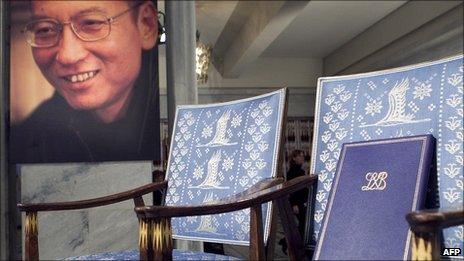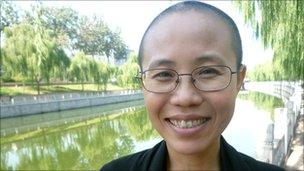One year on: Nobel winner Liu Xiaobo still in jail
- Published

Liu was China's first Nobel Peace laureate - but he could not receive it in person
In one big respect, life has changed little in the past 12 months for the man who won last year's Noble Peace Prize.
As the Nobel committee prepares to hand out this year's award, Chinese dissident Liu Xiaobo is exactly where he was last October - in jail.
He is serving an 11-year sentence for inciting the subversion of state power.
If anyone hoped this award might bring about a reduction in the activist's sentence or a more open society in China, they were wrong.
The opposite has happened. Liu Xiaobo's wife, Liu Xia, appears to be under house arrest and other Chinese campaigners have been targeted.
But the debate about human rights in China has not gone away.
The 55-year-old's award - and later the Arab Spring - seems to have renewed the focus on China's political system, even among its own top leaders.
Long-time activist
Liu Xiaobo was sentenced on Christmas Day 2009 for helping to draft a manifesto - Charter '08 - calling for political change.
At the time he had been speaking out for 20 years, although he was still a relatively unknown figure both inside and outside China.
But his criminal conviction, the manifesto he proposed and the harsh sentence he received suddenly catapulted him onto the international stage.
And it happened just as the Nobel Peace Prize committee was looking to honour someone who had stood up to the Chinese government.

Liu Xiaobo's wife, Liu Xia, disappeared from public view shortly after her husband won the peace prize
It was having difficulty deciding which activist to choose.
"We knew from experience that the dissident community was divided," Geir Lundestad, the permanent secretary to the Nobel committee, said just a few days ago.
"In one sense the Chinese government made the decision easy. Liu Xiaobo went from one of several candidates to the most prominent symbol of human rights in China."
Immediately after the award was announced, Liu Xia, the dissident's wife, went to see him in jail, in the city of Jinzhou in northeast China.
She told her husband about the award - and passed back news to the Nobel committee that he was happy to have received it.
Up until then Liu Xia had been visiting her husband regularly in prison, where the activist, academic and author spent his time reading, running and writing letters to his wife.
After the award though, things changed.
Liu Xia suddenly disappeared from view, her Beijing home off-limits and guarded by security officers.
Her telephone, internet connection and other contact with the outside world was severed. Little has been heard from her since.
Expected reaction
When the United Nations Working Group on Arbitrary Detention asked earlier this year about these restrictions, the Chinese government admitted that "no legal enforcement measure" had been taken against her.
But it continues to detain her anyway - without justification, according to the UN working group.
Hu Jia, another Chinese activist who has spent time in prison, recently tried to visit Liu Xia, but was stopped by a guard before he got to her apartment.
"As a man with long experience of this kind of thing, I believe the security implies that she is at home and under house arrest," said Mr Hu.
The BBC was also turned away when we tried to visit.
Hu Jia also said Liu Xia had been able to visit her husband four times during the past year, although other reports suggest that has not been the case.
He added that Liu Xiaobo was allowed to return home last month - free from handcuffs and leg irons - to mourn the death of his father.
'Very patient'
For other activists, bloggers and lawyers, life has also become more difficult over the last 12 months.
The political upheaval in the Middle East and North Africa appears to have worried China's leaders, who fear these revolutions might lead to calls for change here.
Their reaction has been to crack down on anyone who might agitate for change.
People have been detained, prosecuted and sometimes simply scared, in an apparent attempt to curtail their already limited activities.
"All hopes were dashed if anyone had expected that some positive change in the human rights situation in China would result from awarding the Nobel Peace Prize to a Chinese citizen for the first time," commented the Chinese Human Rights Defenders.
Mr Lundestad said the Nobel Peace Prize committee had not been surprised by China's reaction and remained "very proud" of its award to Liu Xiaobo.
The committee is now waiting for him to collect his medal, pick up his prize money, worth about $1.5m, and give his Nobel lecture.
The dissident still has eight years of his sentence left to serve so that might not happen for some time - if ever.
But as Mr Lundestad said: "We are very patient."
- Published9 December 2010
- Published10 December 2010
- Published9 December 2010
- Published10 December 2010